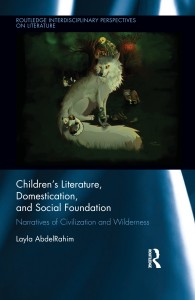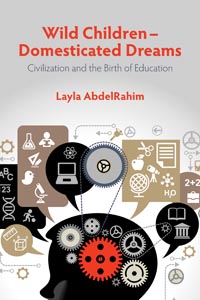I am an independent scholar and author with no institutional funding. Please, consider supporting me on Patreon so I can continue to do the work. Thank you!
Book Review of Children’s Literature, Domestication, Social Foundation: Narratives of Civilization and Wilderness (Routledge)
Book Review
Layla AbdelRahim, Children’s Literature, Domestication, and Social Foundation: Narratives of Civilization and Wilderness New York: Routledge, 2015 & 2018; 265pp, Hardback ISBN 9780415661102; Paperback ISBN 9781138547810
By Petar Jandric, Professor, Zagreb University of Applied Sciences
In Anarchist Studies; Vol. 26, #1, Spring 2018 (Peer-reviewed, academic journal)
Without much thinking, we often juxtapose wilderness and civilisation. The ontology of wilderness translates into anarchy, and the ontology of civilisation translates into order. However, Layla AbdelRahim shows that this neat and orderly dichotomy is a mere fad – the human world consists of wilderness, and of civilisation, and of endless shades of grey between the two.
In the introductory chapter, AbdelRahim introduces the main theoretical underpinnings of her work through descriptions of culture, wildness, civilisation, colonisation and literature. She proceeds with an interesting biographical perspective which illuminates the paths of her thinking, the diverse influences on her work, and her unusually cosmopolitan life trajectory. AbdelRahim was born in Moscow, in an inter-racial, inter-continental, and multi-lingual family. As a child she moved to Sudan, and later to Europe and Canada, and she speaks Russian, English, Arabic, and some Italian. It is at through this combination of influences, that she acquired the unique perspective that informs her critique of civilisation and wilderness.
In the first part of the book, AbdelRahim explores Epistemologies of Chaos and the Orderly Unknowledge of Literacy. Her work is based on analyses of a wide spectrum of primary sources such as Tove Jansson’s Moomin series, Nikolai Nosov’s The Adventures of Dunno and Friends, C.S. Lewis’s The Chronicles of Narnia, A.A. Milne’s Winnie-the-Pooh, and many others. AbdelRahim interprets these works through a selection of important theorists and philosophers including Foucault, Bourdieu, and Derrida; she also connects them to works of important anarchists such as Kropotkin and Zerzan. It is through this masterful connection between primary sources, philosophy, and (anarchist) theory, that AbdelRahim draws a powerful distinction between ‘“primitive” society, where members express gratitude for all creation and warn against futile destruction of life, from ‘civilised’ (consumer) society, which sees its meaning for existence in domestication, exploitation, and a birth-given right to devour’ (p114).
AbdelRahim’s critique is especially powerful in regard to the relationships between Kropotkin’s theory of mutual aid and Charles Darwin’s theory of evolution. She provides a nuanced understanding of Kropotkin’s work and emphasises that mutual aid does not imply personal disinterest. Similarly, she emphasises an often-ignored fact that Darwin’s theory was not just about the survival of the fittest. Using fictional accounts, she reminds readers that both theories are mere metaphors for describing a complex social universe, and explores the improbable scenarios, and shows the unfortunate consequences of applying these metaphors too literally. As often happens in anthropological research, AbdelRahim shows that the truth is hidden somewhere between the metaphors. While she clearly stands closer to (crude interpretations of) Kropotkin than Darwin, AbdelRahim does a great job in linking their powerful metanarratives to a wider cultural context.
The second part of the book, Genealogical Narratives of Wilderness and Domestication: Identifying the Ontologies of Genesis and Genetics in Children’s Literature, analyses the ontological premises of wilderness and civilisation. Here, AbdelRahim first explores eternal concepts such as love and truth, then links these concepts to the construction of identity. This section is packed with little gems of great analysis, such as AbdelRahim’s use of Foucault to construct the identity of zoo animals and expand this construction to all members of the consumer society. However, probably because my own line of research is in digital cultures, I was most impressed by AbdelRahim’s analysis of Donna Haraway’s cyborg theory through various examples of science fiction stories from Mary Shelley’s Frankenstein, through Stanley Kubrick’s 2001 Space Odyssey, to Phillip K. Dick’s Do Androids Dream of Electric Sheep? In a mere five or six pages, AbdelRahim tackles complexities and nuances which are debated in thousands of pages in various media studies journals clearly and accessibly, and provides a succinct account of the contemporary relationships between humans and technologies.
The last section, In the End: Anthropological Narratives in Fiction and Life, brings together diverse and often disconnected lines of argument into a single ‘conclusion’. I place the word conclusion in quotation marks deliberately, because AbdelRahim does not offer the short, bulleted, prescriptive concluding remarks which are so popular in academic writing. Acknowledging the complex nature of the theme, she asserts that human beings need both wilderness and civilisation. Yet, while civilisation provides us with protection from forces of nature and chaotic social arrangements, it is in the realm of wilderness that we need to seek refuge from the perils of commodified human relationships and the inspiration for a better and more just life. Therefore, anarchism is not just another philosophy, or ontology, or social theory – it is the very basis of human and social development.
Using a powerful inter-disciplinary methodology, Layla AbdelRahim’s Children’s Literature, Domestication, and Social Foundation provides a nuanced and mature theory of wilderness and civilisation. The book is written well, yet the complex writing style and numerous references might make it hard to follow for non-academic audiences. But this is the only serious drawback of AbdelRahim’s work, which expresses some very important ideas, and these ideas should be somehow made accessible to a much wider population.
Petar Jandric, Zagreb University of Applied Sciences
Filed in: Uncategorized.









